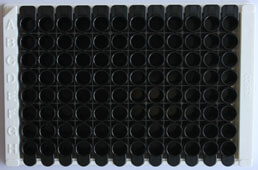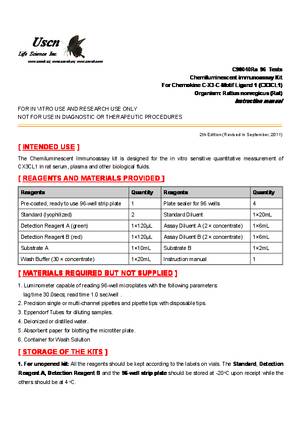Packages (Simulation)

Reagent Preparation

Image (I)
Certificate


CLIA Kit for Chemokine C-X3-C-Motif Ligand 1 (CX3CL1)
NTN; ABCD3; C3Xkine; CXC3; CXC3C; NTT; SCYD1; ABCD3; FKN; Neurotactin; Fractalkine; Small Inducible Cytokine Subfamily D(Cys-X3-Cys)Member 1
- Product No.SCA040Ra
- Organism SpeciesRattus norvegicus (Rat) Same name, Different species.
- Sample TypeSerum, plasma and other biological fluids
- Test MethodDouble-antibody Sandwich
- Assay Length2h, 40min
- Detection Range3.43-2,500pg/mL
- SensitivityThe minimum detectable dose of this kit is typically less than 1.43pg/mL.
- DownloadInstruction Manual
- UOM 48T96T 96T*5 96T*10 96T*100
- FOB
US$ 638
US$ 912
US$ 4104
US$ 7752
US$ 63840
For more details, please contact local distributors!
Specificity
This assay has high sensitivity and excellent specificity for detection of Chemokine C-X3-C-Motif Ligand 1 (CX3CL1).
No significant cross-reactivity or interference between Chemokine C-X3-C-Motif Ligand 1 (CX3CL1) and analogues was observed.
Recovery
Matrices listed below were spiked with certain level of recombinant Chemokine C-X3-C-Motif Ligand 1 (CX3CL1) and the recovery rates were calculated by comparing the measured value to the expected amount of Chemokine C-X3-C-Motif Ligand 1 (CX3CL1) in samples.
| Matrix | Recovery range (%) | Average(%) |
| serum(n=5) | 95-102 | 98 |
| EDTA plasma(n=5) | 86-95 | 91 |
| heparin plasma(n=5) | 91-99 | 96 |
Precision
Intra-assay Precision (Precision within an assay): 3 samples with low, middle and high level Chemokine C-X3-C-Motif Ligand 1 (CX3CL1) were tested 20 times on one plate, respectively.
Inter-assay Precision (Precision between assays): 3 samples with low, middle and high level Chemokine C-X3-C-Motif Ligand 1 (CX3CL1) were tested on 3 different plates, 8 replicates in each plate.
CV(%) = SD/meanX100
Intra-Assay: CV<10%
Inter-Assay: CV<12%
Linearity
The linearity of the kit was assayed by testing samples spiked with appropriate concentration of Chemokine C-X3-C-Motif Ligand 1 (CX3CL1) and their serial dilutions. The results were demonstrated by the percentage of calculated concentration to the expected.
| Sample | 1:2 | 1:4 | 1:8 | 1:16 |
| serum(n=5) | 96-105% | 94-101% | 95-104% | 89-101% |
| EDTA plasma(n=5) | 78-103% | 78-102% | 97-104% | 80-97% |
| heparin plasma(n=5) | 83-101% | 78-103% | 80-93% | 88-102% |
Stability
The stability of kit is determined by the loss rate of activity. The loss rate of this kit is less than 5% within the expiration date under appropriate storage condition.
To minimize extra influence on the performance, operation procedures and lab conditions, especially room temperature, air humidity, incubator temperature should be strictly controlled. It is also strongly suggested that the whole assay is performed by the same operator from the beginning to the end.
Reagents and materials provided
| Reagents | Quantity | Reagents | Quantity |
| Pre-coated, ready to use 96-well strip plate | 1 | Plate sealer for 96 wells | 4 |
| Standard | 2 | Standard Diluent | 1×20mL |
| Detection Reagent A | 1×120µL | Assay Diluent A | 1×12mL |
| Detection Reagent B | 1×120µL | Assay Diluent B | 1×12mL |
| Substrate A | 1×10mL | Substrate B | 1×2mL |
| Wash Buffer (30 × concentrate) | 1×20mL | Instruction manual | 1 |
Assay procedure summary
1. Prepare all reagents, samples and standards;
2. Add 100µL standard or sample to each well. Incubate 1 hours at 37°C;
3. Aspirate and add 100µL prepared Detection Reagent A. Incubate 1 hour at 37°C;
4. Aspirate and wash 3 times;
5. Add 100µL prepared Detection Reagent B. Incubate 30 minutes at 37°C;
6. Aspirate and wash 5 times;
7. Add 100µL Substrate Solution. Incubate 10 minutes at 37°C;
8. Read RLU value immediately.
GIVEAWAYS
INCREMENT SERVICES
-
 Single-component Reagents of Assay Kit
Single-component Reagents of Assay Kit
-
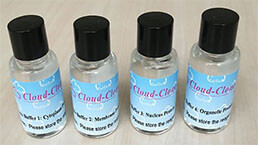 Lysis Buffer Specific for ELISA / CLIA
Lysis Buffer Specific for ELISA / CLIA
-
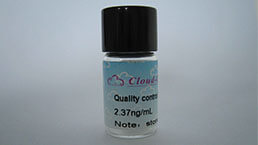 Quality Control of Kit
Quality Control of Kit
-
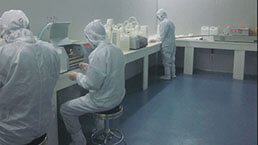 CLIA Kit Customized Service
CLIA Kit Customized Service
-
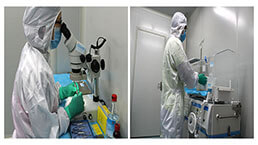 Disease Model Customized Service
Disease Model Customized Service
-
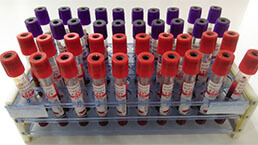 Serums Customized Service
Serums Customized Service
-
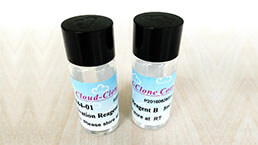 TGFB1 Activation Reagent
TGFB1 Activation Reagent
-
 Real Time PCR Experimental Service
Real Time PCR Experimental Service
-
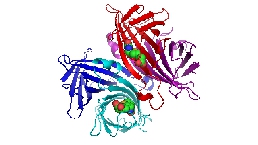 Streptavidin
Streptavidin
-
 Fast blue Protein Stain solution
Fast blue Protein Stain solution
-
 Single-component Reagents of FLIA Kit
Single-component Reagents of FLIA Kit
-
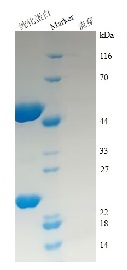 Streptavidin-Agarose Beads
Streptavidin-Agarose Beads
| Magazine | Citations |
| World Journal of Gastroenterology | Preliminary study correlating CX3CL1/CX3CR1 expression with gastric carcinoma and gastric carcinoma perineural invasion NCBI: PMC3989981 |
| International Journal of Colorectal Disease | Downregulation of CX3CR1 ameliorates experimental colitis: evidence for CX3CL1-CX3CR1-mediated immune cell recruitment. pubmed:27942903 |
| Frontiers in Cellular and Infection Microbiology | Reduced CX3CL1 Secretion Contributes to the Susceptibility of Oral Leukoplakia-Associated Fibroblasts to Candida albicans. pubmed:27891323 |
| Blood Coagul Fibrinolysis | Low shear stress upregulates the expression of fractalkine through the activation of mitogen-activated protein kinases in endothelial cells Pubmed:29406386 |
| Journal of Neuroinflammation | The prenatal challenge with lipopolysaccharide and polyinosinic: polycytidylic acid disrupts CX3CL1-CX3CR1 and CD200-CD200R signalling in the brains of … Pubmed: 32829711 |
| Cells | Maternal Immune Activation Sensitizes Male Offspring Rats to Lipopolysaccharide-Induced Microglial Deficits Involving the Dysfunction of CD200–CD200R and … Pubmed: 32664639 |
| Journal of Neuroinflammation | CX3CR1-microglia mediates neuroinflammation and blood pressure regulation in the nucleus tractus solitarii of fructose-induced hypertensive rats Pubmed: 32532282 |
| JOURNAL OF PERIODONTAL RESEARCH | Potential biomarkers reflecting inflammation in patients with severe periodontitis: Fractalkine (CX3CL1) and its receptor (CX3CR1) 33641164 |

